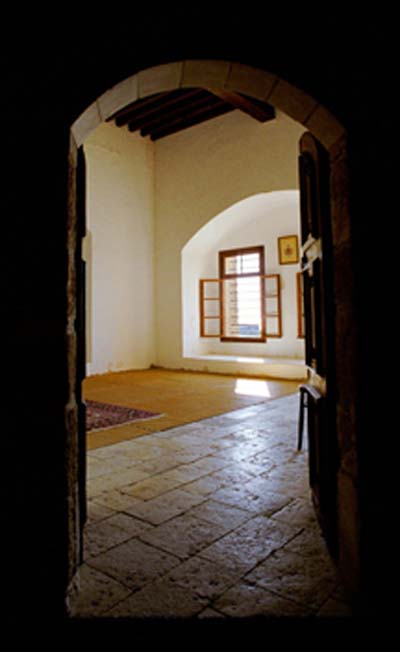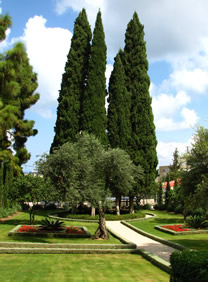Journey to a Sacred City
I never dreamed, when I first encountered the Baha’i Faith as a young adult, that one day I would write a book about its Founder, Baha’u’llah, whose birthday Baha’is celebrate around the world November 12. Yet hearkening back to that time of search I clearly recall that my attention was captured by two things: the extraordinary life of Baha’u’llah and the exquisite beauty of His writings. How could someone who lived the better part of His life as a prisoner and exile – often in the most deplorable and hostile conditions – not only endure, but consistently produce the most inspiring and insightful writings?
I had been a student of literature, but these works were in a different category from that of the usual great writers. In the prayers of Baha’u’llah I found that same spirit familiar to me from studying the Song of Solomon in the Bible or the words of Jesus Christ. The attitude, the tone of voice, conveyed both majesty and profound humility, and urged me on to further investigation. 
The names sounded strange – they are Arabic and Persian
– but we forget, so far removed are we, that neither did Christ give His Sermon on the Mount in English. The strange sounding new Faith raised mis- givings among members of my family. And why shouldn’t they be suspicious of some thing new? So many different people claim, in our fractured world, to have a pathway to the truth – even a divine authority. Deciding what to believe, who to trust, even among the
voices in the religion of one’s childhood, is no longer
an easy matter.
Yet the Baha’i Faith teaches that one of the attributes of God is questions, and questioning seems to come to me by inheritance. From the ancestor who was thrown into a Swiss castle dungeon in 1659, and later exiled, for daring to question and diverge from the accepted religious view. From his sons who crossed the Atlantic half a century later, at the invitation of William Penn, for the promise of religious freedom in a utopian colony in the New World. From the Mennonite family members who came from that stock – still not afraid to choose their own way. These ancestors of mine were not simply a rebellious lot, but individuals who took their choices seriously and had the courage to live with their consequences. Perhaps it was something of their willingness to risk all that drew me forward into my own quest.
What I found in the writings of Baha’u’llah began to answer other questions with which I had grappled. What of those who faithfully followed a religion different from mine? The ecumenical activities I had participated in as a Christian left Buddhists, Hindus, Muslims, even Jews at that time, out- side the framework of conciliation.
The vision of Baha’u’llah,
I found, embraces all the great religions. They are viewed as essential pieces in an unfolding pattern of guidance given by one God, the Creator of all humankind.
 I came to believe that Baha’u’llah was indeed a divine Messenger, not because His answers were simply agreeable, but rather because they drew me beyond my own narrow limits and opened wide the doors onto a whole new world.
I came to believe that Baha’u’llah was indeed a divine Messenger, not because His answers were simply agreeable, but rather because they drew me beyond my own narrow limits and opened wide the doors onto a whole new world.
More importantly,
His words resonated with truth. He did not promise “seven easy steps to heaven,”
or even that belief is sufficient in a world that cries out for justice.
The nature of religion, as defined by Baha’u’llah, requires humanity to participate in the shaping of its future.
Which brings me to the celebration at hand – the Birth of Baha’u’llah -- and to the question left unasked by more than one member of my family circle: Why did I choose to tell this story, The Story of Baha’u’llah? Truthfully, there are more reasons than I have room here to write. But equally true is that I wrote The Story of Baha’u’llah to answer questions, the questions that must arise in response to so great a claim as that advanced by Baha’u’llah – that He is God’s Messenger to humankind for this day. What constitutes the proof of a Prophet of God? In the words of Christ, “You will know them by their fruits.” (Matt.7:16)
It is only natural then to ask: How did Baha’u’llah live His life? How did His actions correspond to His words? What were the choices by which His days were measured? How did He treat those who loved Him or respond to those who betrayed Him? How were others – whether friend or enemy, believer or nonbeliever – affected by His presence? What effect did He exert on the larger world?
These are the questions by which we evaluate any life. My hope in relating not only the public events of Baha’u’llah’s life, but the more intimate facts as well, is to enable the reader to gain insight into a life that is compelling by any standard – and which continues to inspire countless souls.

Not long ago I traveled across the Atlantic, in the opposite direction this time from the travels of my ancestors. Theirs had been a journey of hope; mine was a pilgrimage of gratitude. In the Holy Land I climbed steps cut from the cream-colored stone of Galilee, steps that rise from the foot of Mount Carmel to its summit. Baha’u’llah had walked upon this mountain in His last days.
The once rocky slopes, which had cradled the footsteps of the Prophets of old, are adorned now with the terraced gardens and graceful structures that comprise the World Center of the Baha’i Faith.
As I climbed, terrace by terrace, the noise of the busy city streets below – car horns and taxis, the talk and laughter of people at outdoor cafes – receded into the background. Flowers and foliage, the sounds of softly splashing fountains and warbling birds, became along the way the gardens of paradise – an oasis for the spirit. This place, at the heart of the planet, is a point of pilgrimage for the five million Baha’is who live in every part of the globe.
Yet the most sacred space – the point where religion begins and to which it all returns – is still the human heart. “It is not Our wish to lay hands on your kingdoms,” Baha’u’llah assured the kings and rulers of the world. “That which He (God) hath reserved for Himself are the cities of men’s hearts.” Each one of us decides, in the private recesses of those inner chambers, to whom we will, at last, entrust the keys of that sacred city.
______________________________________________________________________________________________________
1. from The Kitab-i-Aqdas, p.50. 2. from Gleanings from the Writings of Baha’u’llah, p.241.
Published online as “The extraordinary life of Baha’u’llah”
ALL PHOTOS this Essay © Baha’i International Community